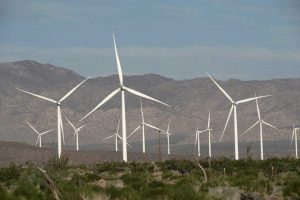A top Democrat wants Biden's infrastructure bill to reduce energy tax breaks, limit them to green initiatives

- Sen. Ron Wyden, who leads the Senate Finance Committee, wants Biden's infrastructure bill to cut tax breaks for the energy industry and limit them to green initiatives.
- Congress is still in the process of passing Biden's $1.9 trillion Covid relief measure, which is expected to head to the president's desk next week.
- Yet Democrats have already begun turning their attention to a massive infrastructure initiative, which Biden has dubbed "Build Back Better."
President Joe Biden's coming infrastructure plan should dramatically reduce tax breaks for the energy industry and focus them on green initiatives, the chairman of a powerful Senate committee told CNBC.
Sen. Ron Wyden, who leads the Senate Finance Committee, said such an overhaul is at the top of his agenda.
"I think this would trigger a real transformation for the economy," Wyden, D-Ore., said in an interview.
Congress is still in the process of passing Biden's $1.9 trillion Covid relief measure, which is expected to head to the president's desk next week. Yet Democrats have already begun turning their attention to a massive infrastructure initiative, which Biden has dubbed "Build Back Better." The White House has begun meeting with lawmakers from both sides of the aisle to seek input on a multitrillion-dollar package.
Wyden's committee has jurisdiction over the nation's tax code and would be responsible for crafting major portions of Biden's infrastructure plan, making him a key player in the negotiations over the contours of the bill.
Wyden called the system of 44 separate tax breaks for the energy industry "dilapidated," and said his goal is to replace them with just three: one for clean energy, one for clean transportation fuel and one for energy efficiency.
"I'm telling my Republican colleagues, 'Hey folks, we always say we should work together to reduce subsidies.' That's what I'm talking about," Wyden said. "I think we can ignite an enormous array of economic opportunities [and] high-skill, high wage jobs in clean energy manufacturing."
GOP lawmakers have warned that Democrats go-it-alone strategy on the Covid relief bill could poison the well for compromise on future legislation. Rep. Kevin Brady of Texas, the top Republican on the tax-writing committee in the House, cautioned that changes to the industry's tax incentives could undermine job creation.
"The energy sector targeted by Democrats is able to deduct investment costs similar to any other business — hardly 'subsidies' compared to the lucrative tax credits Democrats will offer to their hand-selected 'green' companies," he told CNBC. "Americans deserve an all-of-the-above approach that means more jobs and affordable and reliable energy."
Biden has made combating climate change a priority for his administration, calling on lawmakers to eliminate fossil fuel subsidies from Congress' annual spending bill. According to the bipartisan Environmental and Energy Studies Institute, which advocates for sustainable societies, those tax breaks alone are worth roughly $20 billion a year. The majority are dedicated to natural gas and crude oil. About 20% are directed at coal.
Wyden told CNBC he is still hammering out the details of his proposal and would not estimate what its price tag might be.
Wyden's committee will also have control over any measures that raise revenue to pay for the infrastructure plan. The White House has proposed raising the corporate tax rate from 21% to 28%. Wyden said he is considering the increase as well as more targeted measures to encourage domestic manufacturing.
"I want us to really honeycomb the various provisions, and make sure, unlike today, that the incentives are for doing business in the United States, rather than doing business overseas," he said.
This week, Sen. Elizabeth Warren, D-Mass., suggested another way to pay for the infrastructure bill: a wealth tax. She is renewing her push for a 2% tax on individuals worth at least $50 million and a 1% surtax on those worth more than $1 billion. She cited analysis that projects it could raise $3 trillion over a decade, potentially covering the entire cost of Build Back Better.
Wyden would not say whether he supports her plan, only that he "welcomes proposals for making the tax code more fair."
While the next big package will be focused on infrastructure, Wyden said he intends to push for additional pandemic relief to be included. He wants to extend enhanced unemployment benefits and to make stimulus payments recurring – and tie them both to broader economic conditions.
"When you talk to people all across the political spectrum, they say, that makes sense: When the economy is going strong, the benefit tapers down. When the economy is not going so hot, the benefit reflects that," Wyden said.
Source: Read Full Article
